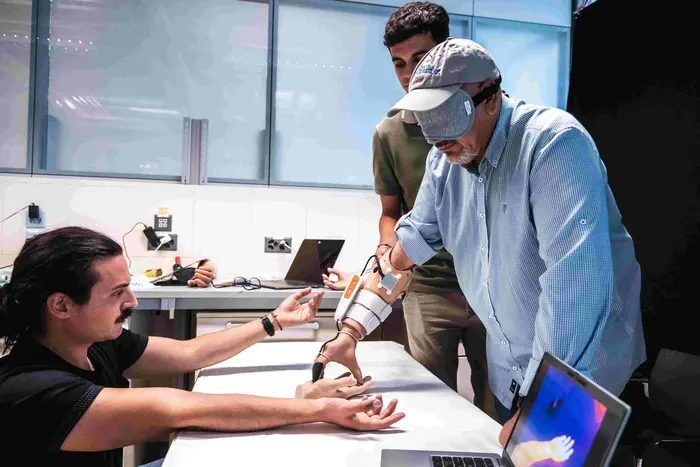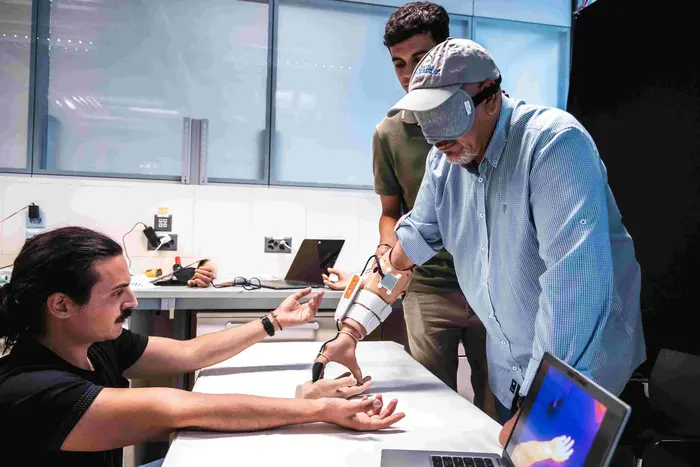Pisa, 9 February 2024. “When one of the researchers placed the sensor on his own body, I could feel the warmth of another person with my phantom hand. it was a very strong emotion for me, it was like reactivating a connection with someone”.

Credit: EPFL/Caillet
Pisa, 9 February 2024. “When one of the researchers placed the sensor on his own body, I could feel the warmth of another person with my phantom hand. it was a very strong emotion for me, it was like reactivating a connection with someone”.
Thanks to a sensorised prosthetic hand that provides realistic and real-time thermal feedback, Fabrizio, a 57-year-old man from Pistoia with a transradial (wrist) amputation, was able to discriminate between and manually sort objects of different temperatures or materials and sense bodily contact with other humans.
The new technology is presented in a study published today in the journal Med (Cell Press); the work is the result of a scientific collaboration between the Sant’Anna School of Advanced Studies in Pisa (Italy) and École Polytechnique Fédérale de Lausanne (Switzerland). This is the first time that natural temperature sensations are incorporated in a functional artificial limb*.
“Temperature is one of the last frontiers to restoring sensation to robotic hands. For the first time, we’re really close to restoring the full palette of sensations to amputees” says Professor Silvestro Micera (Sant’Anna School of Advanced Studies and EPFL), joint senior author of the study.
Towards a hand prosthesis capable of restoring a full palette of sensations
Sensory feedback is one of the most important steps to allowing people with an amputation to interact with their environment. Building on previous findings on phantom thermal sensations (stimulation of specific points on the residual arm to evoke perceptions in the missing hand), researchers have developed a device, the ‘MiniTouch‘, which allows amputees to perceive and respond to temperature by transmitting thermal information from the fingertip of the prosthetic hand to the amputee’s residual arm. The device uses off-the-shelf electronics, can be integrated into commercially available prosthetic limbs, and does not require surgery.
“This is a very simple idea that can be easily integrated into commercial prostheses” adds Micera.
“Adding temperature information makes the touch more human-like,” says dr. Solaiman Shokur, joint senior author, of École Polytechnique Fédérale de Lausanne. “We think having the ability to sense temperature will improve amputees’ embodiment—the feeling that ‘this hand is mine’.”
“Up to now, thermal sensations have been very much neglected in neuroprosthetics research even if there is increasing evidence of their importance in our everyday life. We think that amputee individuals could benefit from regaining temperature sensations well beyond the detection of cold or warm objects” says Jonathan Muheim, PhD student at EPFL and co-first author of the paper.
How the MiniTouch device works
The testing phase was carried out at the Inail Prosthesis Centre in Vigorso di Budrio (Bologna)** with the cooperation of Dr. Emanuele Gruppioni (INAIL) and his team, who carried out the clinical tests with the amputees. The device was integrated into the patient’s personal prosthesis and was attached to a point on the same residual limb, producing thermal sensations in the person’s phantom index finger.
The research team tested the amputee’s ability to distinguish between objects of different temperatures and materials. Using the MiniTouch, the patient was able to discriminate between three visually indistinguishable bottles containing cold, cool and hot water with 100% accuracy, whereas, without the device, his accuracy was only 33%. The MiniTouch device also improved his ability to accurately and quickly classify metal cubes of different temperatures.
“When you reach a certain level of dexterity with robotic hands, you really need to have sensory feedback to really be able to use the robotic hand to its full potential,” says Solaiman Shokur.
In addition, the MiniTouch device improved the participant’s ability to differentiate between human and prosthetic arms while blindfolded — from 60% without the device to 80% with the device. Several amputees participating in the initial trials reported that the ability to rediscover body contact with another person was the most important benefit of the system.
“Our goal now is to develop a multimodal system that integrates touch, perception, and temperature sensations,” says Shokur. “With that type of system, people will be able to tell you ‘this is soft and hot’, or ‘this is hard and cold’.”
The technology is currently being tested in the laboratory. The next step will be to make the device ready for home use and to integrate thermal information from multiple points of an amputee’s phantom limb: for example, allowing people to differentiate thermal and tactile sensations on their finger and thumb might help them grasp a hot beverage, while enabling sensation in the back of the hand might improve the feeling of human connection by allowing amputees to sense when another person touches their hand.
Silvestro Micera concluded: “This study paves the way for more natural hand prostheses that restore a full range of sensations, offering amputees a richer and more natural perception of the tactile world”.
—
The Sant’Anna School of Advanced Studies (Pisa, Italy) is a public university working in the field of applied sciences: Economics and Management, Law, Political Sciences, Agricultural Sciences and Plant Biotechnology, Medicine, and Industrial and Information Engineering. It is first in the list of Italian Universities, and consistently in the top 2% globally in the Times Higher Education Young University Rankings. https://www.santannapisa.it/en
*This research was supported by the Bertarelli Foundation, the Swiss National Science Foundation, the European Union’s Horizon 2020 research and innovation program, the Horizon Europe Research & Innovation Programme and the Ministry of University and Research.
**INAIL is the Italian National Institute for Insurance against Accidents at Work
Journal
Med
DOI
10.1016/j.medj.2023.12.006
Method of Research
Case study
Subject of Research
People
Article Title
A sensory-motor hand prosthesis with integrated thermal feedback
Article Publication Date
9-Feb-2024
COI Statement
None





